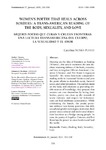Mostrar o rexistro simple do ítem
Women’s Poetry that Heals across Borders: A Trans-American Reading of the Body, Sexuality, and Love
| dc.contributor.author | Núñez-Puente, Carolina | |
| dc.date.accessioned | 2021-08-31T07:51:22Z | |
| dc.date.available | 2021-08-31T07:51:22Z | |
| dc.date.issued | 2021 | |
| dc.identifier.citation | Núñez-Puente, Carolina. «Women’s Poetry that Heals across Borders: A Trans-american Reading of the Body, Sexuality, and Love». In Feminismo/s, 37 (January 2021): 333-358. https://doi.org/10.14198/fem.2021.37.14 | es_ES |
| dc.identifier.issn | 1696-8166 | |
| dc.identifier.issn | 1989-9998 (Internet) | |
| dc.identifier.uri | http://hdl.handle.net/2183/28404 | |
| dc.description.abstract | [Abstract] Drawing on the idea of literature as healing (Wilentz), this article examines the anti-dualistic restoring defense of the body, sexuality, and love in Angelou (African American), Cisneros (Chicana), and Peri Rossi (Uruguayan Spanish). My trans-American comparative reading seeks to transcend frontiers and join the poets’ efforts to demolish racist, (hetero) sexist, and other prejudices. The authors insist on the body and emotions as providing reliable sources of knowledge; they propose that women can cure themselves by loving their bodies, poetry can close up the wounds of sexist violence, and respect for lesboeroticism can heal intolerant communities. While celebrating the female, the poetic personae embrace non-binary positions that defy sexual and gender stereotypes; moreover, their poems’ cross-cultural and multi-tonal dimension functions as a bridge among people. In sum, the poetry of Angelou, Cisneros, and Peri Rossi has the power to cross borders and heal the world.. | es_ES |
| dc.description.abstract | [Resumen] Partiendo de la idea de literatura curativa (Wilentz), este artículo examina la defensa anti-dualista y reparadora del cuerpo, la sexualidad y el amor en Angelou, Cisneros y Peri Rossi. Mi lectura transamericana busca trascender las fronteras y unirse a las poetas para demoler los prejuicios racistas, (hetero)sexistas y de otro tipo. Las autoras insisten en el cuerpo y las emociones como fuentes de conocimiento; proponen que las mujeres pueden curarse a sí mismas amando sus cuerpos, la poesía puede cerrar las heridas de la violencia machista y el respeto por el lesboerotismo puede curar a las comunidades intolerantes. Mientras celebran a la mujer, las voces poéticas adoptan posiciones no binarias que desafían estereotipos; además, la dimensión transcultural y multitonal de sus poemas funciona como un puente entre las personas. En resumen, la poesía de Angelou, Cisneros y Peri Rossi tiene el poder de traspasar fronteras y sanar al mundo. | es_ES |
| dc.language.iso | eng | es_ES |
| dc.publisher | Universidad de Alicante. Instituto Universitario de Investigación de Estudios de Género | es_ES |
| dc.relation.uri | https://doi.org/10.14198/fem.2021.37.14 | es_ES |
| dc.rights | Atribución 4.0 Internacional | es_ES |
| dc.rights.uri | http://creativecommons.org/licenses/by/3.0/es/ | * |
| dc.subject | Poetry | es_ES |
| dc.subject | Healing | es_ES |
| dc.subject | Body | es_ES |
| dc.subject | Sexuality | es_ES |
| dc.subject | Love | es_ES |
| dc.subject | Poesía | es_ES |
| dc.subject | Curación | es_ES |
| dc.subject | Cuerpo | es_ES |
| dc.subject | Sexualidad | es_ES |
| dc.subject | Amor | es_ES |
| dc.title | Women’s Poetry that Heals across Borders: A Trans-American Reading of the Body, Sexuality, and Love | es_ES |
| dc.title.alternative | Mujeres poetas que curan y cruzan fronteras: una lectura transamericana del cuerpo, la sexualidad y el amor | es_ES |
| dc.type | info:eu-repo/semantics/article | es_ES |
| dc.rights.access | info:eu-repo/semantics/openAccess | es_ES |
| UDC.journalTitle | Feminismo/s | es_ES |
| UDC.issue | 37 | es_ES |
| UDC.startPage | 333 | es_ES |
| UDC.endPage | 358 | es_ES |
Ficheiros no ítem
Este ítem aparece na(s) seguinte(s) colección(s)
-
GI-CLEU - Artigos [21]






